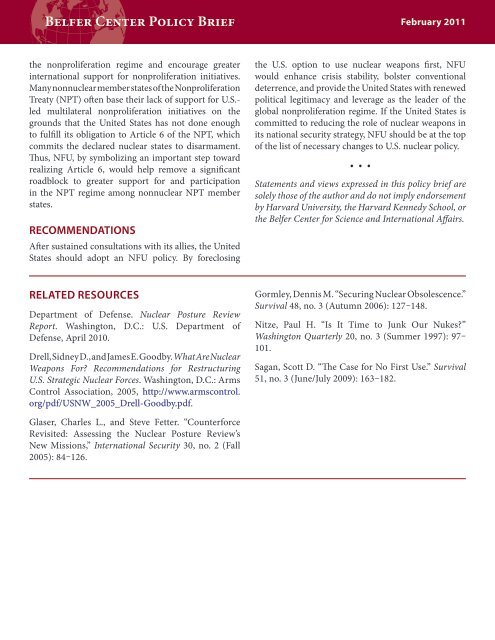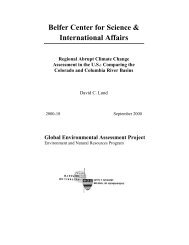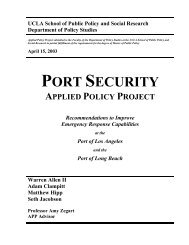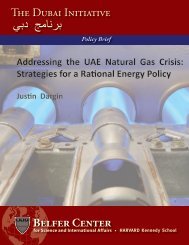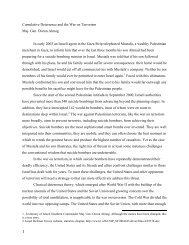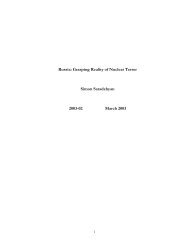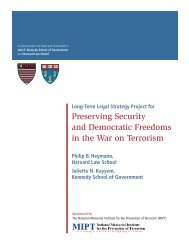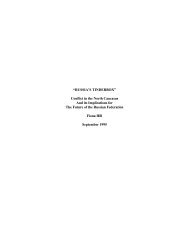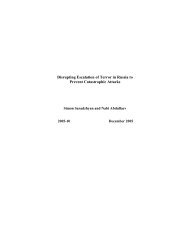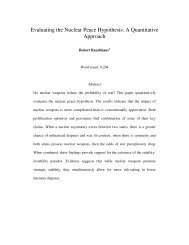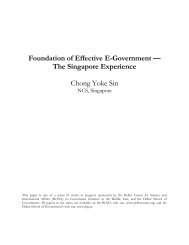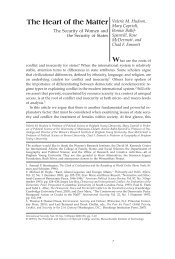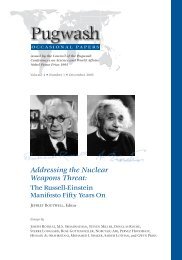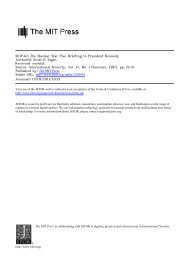The Future of U.S. Nuclear Policy: The Case for No First Use
The Future of U.S. Nuclear Policy: The Case for No First Use
The Future of U.S. Nuclear Policy: The Case for No First Use
Create successful ePaper yourself
Turn your PDF publications into a flip-book with our unique Google optimized e-Paper software.
the nonproliferation regime and encourage greater<br />
international support <strong>for</strong> nonproliferation initiatives.<br />
Many nonnuclear member states <strong>of</strong> the <strong>No</strong>nproliferation<br />
Treaty (NPT) <strong>of</strong>ten base their lack <strong>of</strong> support <strong>for</strong> U.S.led<br />
multilateral nonproliferation initiatives on the<br />
grounds that the United States has not done enough<br />
to fulfill its obligation to Article 6 <strong>of</strong> the NPT, which<br />
commits the declared nuclear states to disarmament.<br />
Thus, NFU, by symbolizing an important step toward<br />
realizing Article 6, would help remove a significant<br />
roadblock to greater support <strong>for</strong> and participation<br />
in the NPT regime among nonnuclear NPT member<br />
states.<br />
RECOMMENDATIONS<br />
After sustained consultations with its allies, the United<br />
States should adopt an NFU policy. By <strong>for</strong>eclosing<br />
RELATED RESOURCES<br />
Department <strong>of</strong> Defense. <strong>Nuclear</strong> Posture Review<br />
Report. Washington, D.C.: U.S. Department <strong>of</strong><br />
Defense, April 2010.<br />
Drell, Sidney D., and James E. Goodby. What Are <strong>Nuclear</strong><br />
Weapons For? Recommendations <strong>for</strong> Restructuring<br />
U.S. Strategic <strong>Nuclear</strong> Forces. Washington, D.C.: Arms<br />
Control Association, 2005, http://www.armscontrol.<br />
org/pdf/USNW_2005_Drell-Goodby.pdf.<br />
Glaser, Charles L., and Steve Fetter. “Counter<strong>for</strong>ce<br />
Revisited: Assessing the <strong>Nuclear</strong> Posture Review’s<br />
New Missions,” International Security 30, no. 2 (Fall<br />
2005): 84–126.<br />
February 2011<br />
the U.S. option to use nuclear weapons first, NFU<br />
would enhance crisis stability, bolster conventional<br />
deterrence, and provide the United States with renewed<br />
political legitimacy and leverage as the leader <strong>of</strong> the<br />
global nonproliferation regime. If the United States is<br />
committed to reducing the role <strong>of</strong> nuclear weapons in<br />
its national security strategy, NFU should be at the top<br />
<strong>of</strong> the list <strong>of</strong> necessary changes to U.S. nuclear policy.<br />
• • •<br />
Statements and views expressed in this policy brief are<br />
solely those <strong>of</strong> the author and do not imply endorsement<br />
by Harvard University, the Harvard Kennedy School, or<br />
the Belfer Center <strong>for</strong> Science and International Affairs.<br />
Gormley, Dennis M. “Securing <strong>Nuclear</strong> Obsolescence.”<br />
Survival 48, no. 3 (Autumn 2006): 127–148.<br />
Nitze, Paul H. “Is It Time to Junk Our Nukes?”<br />
Washington Quarterly 20, no. 3 (Summer 1997): 97–<br />
101.<br />
Sagan, Scott D. “<strong>The</strong> <strong>Case</strong> <strong>for</strong> <strong>No</strong> <strong>First</strong> <strong>Use</strong>.” Survival<br />
51, no. 3 (June/July 2009): 163–182.


